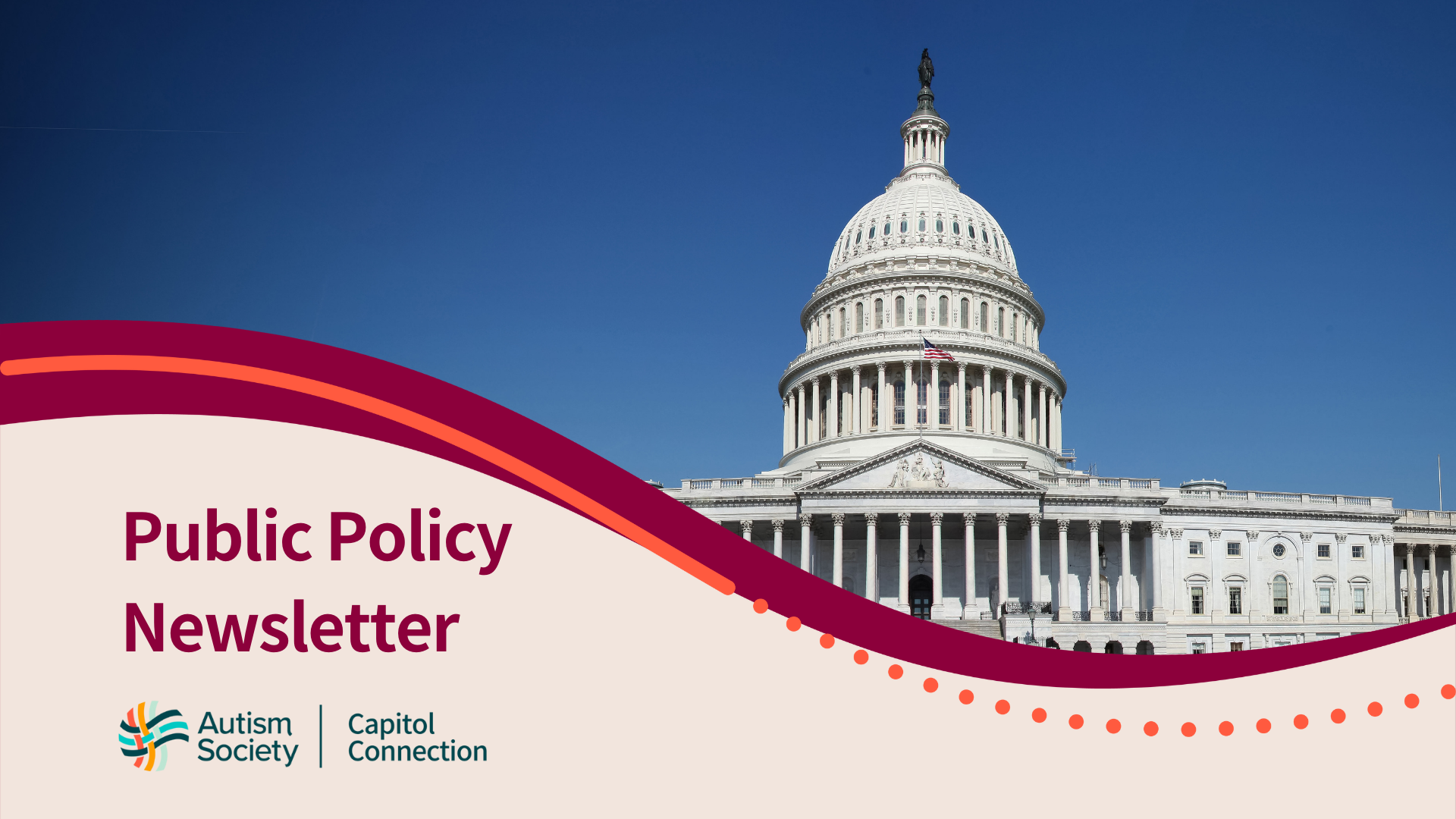
In this issue of Capitol Connection, an update on Congressional action regarding the debt ceiling and new legislation is provided. In addition, find some highlights from the Disability Policy Seminar and Autism Acceptance Month. New alerts and sample letters are now posted on our Action Center to help educate Members of Congress on legislation introduced in Congress.
Debt Ceiling Bill
The House of Representatives narrowly passed a bill called the Limit, Save, Grow Act on April 26th. The bill aims to raise the government’s debt ceiling for one year in exchange for significant cuts to programs important to people with Autism that would be locked in place for the next decade. This includes work requirements for Medicaid that could result in millions losing access. The work requirements apply to all Medicaid pathways, including for those on Supplemental Security Income (SSI) and home and community-based services (HCBS) waivers. People with disabilities would need a doctor or other medical professional to deem them “physically or mentally unfit for employment” to be exempt from the work rules.
The Autism Society issued a statement following the House vote urging Congress to lift the debt ceiling and negotiate the country’s spending priorities through the regular budget and appropriations process. Thanks to those who contacted their Representatives to educate them about the impact of these cuts. Please use the updated Action Alert to educate Senators so that this bill is never signed into law.
To help advocates understand current threats to Medicaid and other disability programs, the Consortium for Constituents with Disabilities created a special resource page on Protecting Medicaid and Essential Programs. Resources include fact sheets on proposed work requirements and Medicaid cuts. In addition, CCD updated its resource page related to the Public Health Emergency wind-down.
Disability Policy Seminar
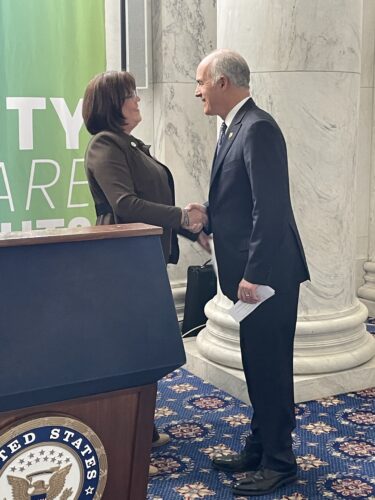
Tracey Staley, Autism Society of America’s Board Chair introduces Senator Casey
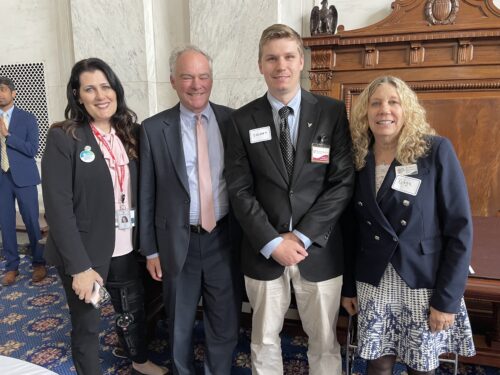
Autism Society of Northern Virginia poses with Senator Kaine
The Autism Society co-sponsored the annual Disability Policy Seminar last week. Approximately 300 people participated in the virtual training on Monday followed by Capitol Hill visits on Thursday. Ten Members of Congress
participated in the Capitol Hill breakfast to greet and speak with participants. They were Senators Casey (D-PA), Kaine (D-VA), Wyden (D-OR), Hassan (D-NH), Murphy (D-CT), and Representatives Beyer (D-VA), Molinaro (R-NY), Bonamici (D-OR), and Wright (R-TX). For those unable to join, the Autism Society will be creating a toolkit to help affiliates make their Hill visit virtually or in their home districts.
New Legislation
Direct Support Workforce Bills
On April 26th, Senator Kaine (D-VA) reintroduced the Supporting Our Direct Care Workforce and Family Caregivers Act (S. 1298), a bill that would authorize grants through the Administration for Community Living to support the recruitment, training, and retention of direct care workers and family caregivers. Co-sponsors of the bill are Senators Bob Casey (D-PA, Kirsten Gillibrand (D-NY), Maggie Hassan (D-NH), Jack Reed (D-RI), Tina Smith (D-MN), Sheldon Whitehouse (D-RI), and Ron Wyden (D-OR).
On April 27th, Senators Hassan and Susan Collins (R-ME) and Representatives Brian Fitzpatrick (R-PA) and Joe Morelle (D-NY) introduced the Recognizing the Role of Direct Support Professionals Act (S. 1332/ H.R. 2941), a bill that would require the creation of a standard occupational classification for direct support professionals.
Autism Family Caregivers Act
On April 27th, World Autism Day, Representatives Grace Meng (D-NY), Brian Fitzpatrick (R-PA.), Henry Cuellar (D-TX), and Marc Molinaro (R-NY) reintroduced the bipartisan Autism Family Caregivers Act. An identical bill was introduced in the Senate by Senators Bob Menendez (D-NJ) and Susan Collins (D-ME). The legislation authorizes the establishment of a five-year pilot program to award grants to nonprofit organizations, community health centers, hospital systems, or a consortium, to provide evidence-based caregiver skills training to family caregivers of children with Autism and other developmental disabilities or delays.
Administration Updates
Caregiving Executive Order
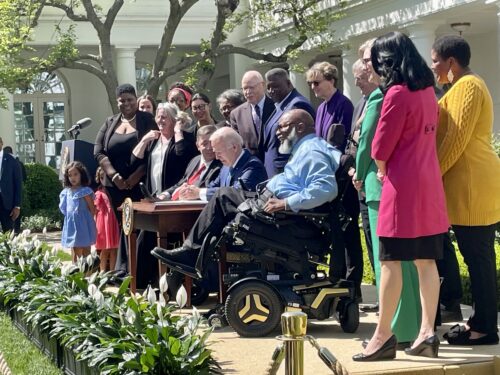
President Biden singing the Executive Order with Disability Advocates
On April 18th, the Autism Society of America joined President Joe Biden at the White House as he signed an Executive Order to improve care for working families and support professionals caring for individuals with disabilities. The Executive Order directs the Department of Health and Human Services to issue several regulations and guidance documents to improve the quality of direct support professionals (DSP). This includes leveraging Medicaid funding to ensure there are enough home care workers to provide care to people with disabilities enrolled in Medicaid; test new models of respite care; target its grants to provide accessible, affordable child care; and taking steps to increase the pay and benefits for Head Start teachers and staff, among other actions.
Proposed “Access Rule” to Improve Medicaid Services
The Centers for Medicare & Medicaid Services (CMS) working with the Administration for Community Living (ACL), published a proposed rule, Ensuring Access to Medicaid Services (Access Rule) to improve access to — and quality of — Medicaid services and promote health equity across the Medicaid program. The proposed rule applies to all Medicaid services, including home and community-based services (HCBS). The Autism Society will be submitting comments. Comments must be received by July 3rd, 2023. The proposed rule strengthens many aspects of Medicaid HCBS, including the direct care workforce, health, and safety protections. This action is related to the President’s executive order on caregiving and services mentioned in the previous article.
IDEA Annual Report
The United States Department of Education released its 44th annual report on the implementation of the Individuals with Disabilities Education Act (IDEA). This report is required annually by Congress for the Department to inform them of the progress being made to implement IDEA. The report includes state-by-state data on individuals served under IDEA, their characteristics, settings, exits, disciplinary removals, and legal disputes. The report found that students with Autism served under IDEA have slightly increased for every age group. To find specific data on your state, look through section 2 on page 83.
Office on Civil Rights Annual Report
On May 1st, the Department of Education’s Office on Civil Rights (OCR) published its annual report for FY 2022. OCR’s mission is to ensure equal access to education and to promote educational excellence across the nation through the vigorous enforcement of civil rights laws. Among its findings in FY 2022, OCR resolved the second highest number of investigations in its history – 16,515 cases—while processing the highest volume of complaints in our history – 18,804 complaints; initiated an unprecedented and targeted 100 proactive compliance reviews; published 7 sets of resources and guidance addressing sex discrimination and disability rights; provided 186 technical assistance presentations; responded to 633 inquiries and 826 FOIA requests; collected civil rights data with a 100% reporting rate from required submitters; revised the Complaint Processing Manual to clarify its processes and added a new tool to help manage the caseload and meet complainants’ and recipients’ interest in efficient resolution.
CDC Expands the ADDM Network
The Centers for Disease Control and Prevention (CDC) announced in March that the Autism and Developmental Disabilities Monitoring (ADDM) Network, which tracks the number and characteristics of children with Autism, is expanding. The funding to support the expansion comes from the Fiscal Year 2023 Appropriations. Five new sites will become a part of the network, including sites in Arizona, Indiana, Pennsylvania, Austin Texas, and Laredo Texas. In addition, four existing sites will expand to track transition planning and co-occurring conditions among 16-year-olds with Autism. For more information, visit the CDC ADDM website.
President’s Committee on IDD
On May 1st, the President’s Committee on Intellectual and Developmental Disabilities (PCIDD) held its first meeting of the year. The Autism Society attended virtually. During the meeting, the committee heard back from workgroups related to the direct workforce crisis and community-based services, employment, emergency management, and other federal support programs. Self-advocate committee members provided compelling testimony on the unmet needs of those with IDD. PCPID is an advisory body that promotes policies and initiatives that support independence and lifelong community inclusion.
Autism Acceptance Month
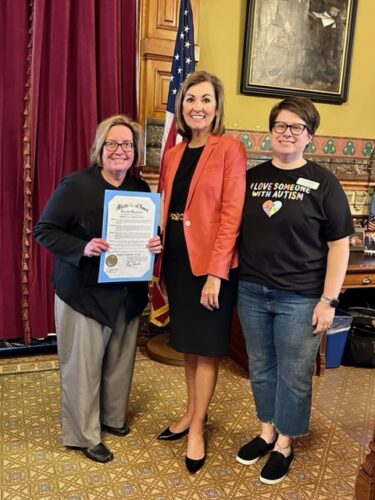
Kris Steinetz from the Autism Society of Iowa poses with Governor Kim Reynolds
President Biden declared April 2nd as World Autism Awareness Day. In his proclamation, he calls for more support for community living and employment for those with Autism in America, along with bringing more awareness to help with early identification. The President also mentioned Kevin and Avonte’s Law which was reauthorized last year. Many Governors across the country also proclaimed April as Autism Acceptance Month.
Kris Steinmetz from the Autism Society of Iowa had a proclamation signing with Iowa Governor Kim Reynolds to declare April as Autism Acceptance Month. In addition, 13 other Governors and two districts/territories declared April as Autism Acceptance Month. Thanks to those state advocates who helped to make this happen
Share:



